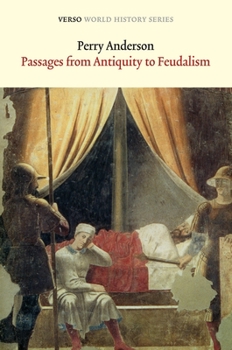Passages from Antiquity to Feudalism
Select Format
Select Condition 
Book Overview
Passages from Antiquity to Feudalism is a sustained exercise in historical sociology that shows how the slave-based societies of Ancient Greece and Rome eventually became the feudal societies of the Middle Ages. In the course of this study, Anderson vindicates and refines the explanatory power of historical materialism, while casting a fascinating light on the Ancient world, the Germanic invasions, nomadic society, and the different routes taken to feudalism in Northern, Mediterranean, Eastern and Western Europe. Through this work and its companion volume, Lineages of the Absolutist State , Anderson presents a Marxist history of Western political development that takes readers from the first stirrings of political consciousness in the classical world to the rise of absolutist monarchies in Europe and the birth of the modern epoch.
Format:Paperback
Language:English
ISBN:1781680086
ISBN13:9781781680087
Release Date:March 2013
Publisher:Verso
Length:304 Pages
Weight:0.05 lbs.
Dimensions:0.9" x 5.4" x 8.2"
Related Subjects
Business Business & Investing Criticism & Theory Europe History History & Criticism Ireland WorldCustomer Reviews
2 ratings
Masterpiece
Published by Thriftbooks.com User , 22 years ago
Superb work of Marxist historiography. Not a history, strictly speaking, but an essay on state forms in transition from the ancient slave societies of Greece and Rome to the fragmented monarchies of early medievalism. Stunning sweep, and a masterpiece of contemporary English prose which I believe will one day rank with Newman's Apologia Pro Vita Sua as a milestone in the evolution of literary English.
Rethinking ethnocentric historical materialism
Published by Thriftbooks.com User , 22 years ago
Perry Anderson is a leading editor of 'New Left Review' and well-known Marxist historian. This book is the first volume of a two part work. The second volume is 'Lineage of the Absolutist State' Those two volumes cover the whole history of pre-capitalist Western world from Greco-Roman antiquity to Absolutist monarchies. It's incredible how one research could cover that range of time. Moreover, he maintains his distinctive perspective throughout two volumes. His problem is the same one as Marx and Weber posed: the formation of capitalism. But Anderson's problem is somewhat narrower: why did the capitalism emerge in Europe rather than in more advanced China, India or Islamic world at that time? To answer the question, he traces back to Greco-Roman antiquity. His answer in the first volume is this: it's because the West was formulated through combining antiquity and feudalism. It doesn't seem distinctive at all. But he questioned in the line of Marxist tradition and his answer could have meaning only in that line. his terminology is different from traditional Marxist one. He recasts the conventional definition of antiquity and feudalism: he contends that the antiquity and the Western feudalism had idiosyncratic modes of production. For example, the slavery itself, which was the dominant mode of production in antiquity, could be common in that time. But outside Greco-Roman world, the slavery was not dominant mode of production. Moreover, the Western feudalism was formed through fusing totally different modes of production: a synthesis of Greco-Roman society and German society. So features of Western feudalism are restricted to its own context, not catholic ones. If we treat it as universal, Anderson argues, we can't explain why the capitalism merged only in the West. To prove his proposition, Anderson compares the different paths Western Europe and Eastern Europe followed. Furthermore, he redefines the relationship between superstructure and infrastructure. As Braudel maintained with his jargon, longue duree, Anderson asserts that components of superstructure, such as the state, religion, value, law, convention, also affect the mode of production.





